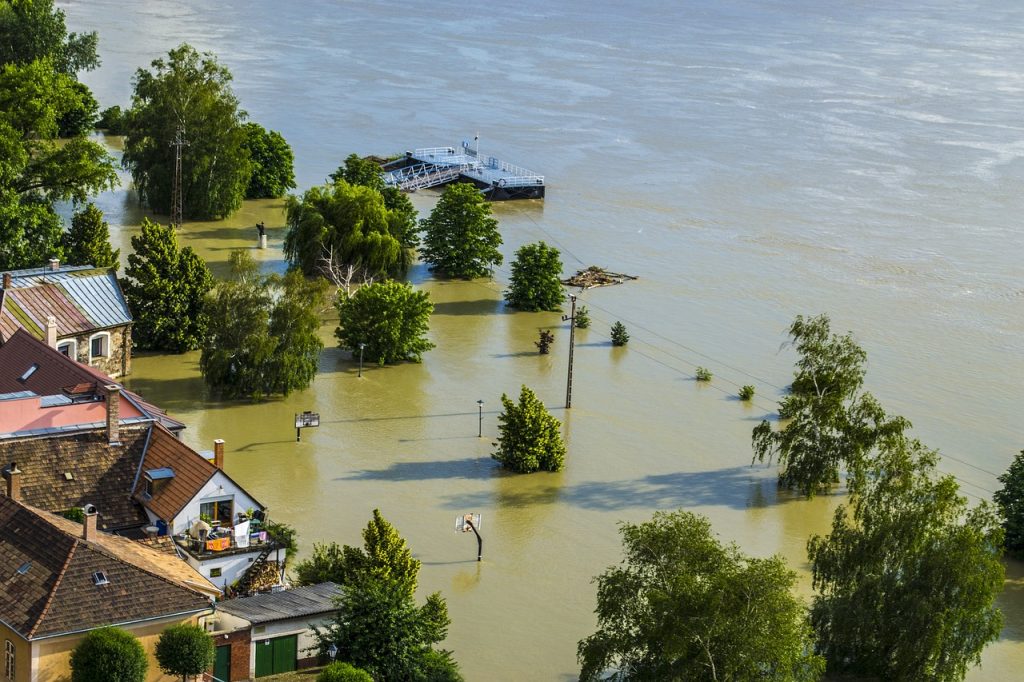Are you worried about your home being vulnerable to flooding?
You're not alone. Floods can happen anywhere and at any time, because of extreme weather conditions or a burst pipe, causing severe damage to your property. That's why taking the necessary steps to protect your home from flooding is crucial. Being cautious can reduce the risk of flood damage and save thousands of euros in repair costs.
In this article, we'll discuss practical tips on protecting your home from flooding and why it's essential to have the right kind of insurance coverage.
1. Install a Sump Pump
Understanding your local flood risk is vital to prevent flood damage. Researching the flooding history in your area will help you better understand what kind of risk you may face. Your local municipality, police, or fire department can provide information on their websites that detail past flooding incidents and any specific areas vulnerable to flooding.
Installing a sump pump in the basement or lowest level of your home can help protect against excess water. Sump pumps effectively remove water that accumulates due to heavy rains or burst water pipes. It pushes excess water into storm sewers or dry wells outside the house so that they don't build up inside your basement or crawlspace and cause further damage.
It's important to note that sump pumps require proper installation and maintenance to function correctly. If the pump is not installed properly, it may not work as intended, leading to potential water damage. Additionally, sump pumps should be tested regularly to ensure they work perfectly in the event of a flood or heavy rain.
2. Elevate Your Belongings
Appliances such as washers, dryers, and refrigerators can be expensive to replace if they get damaged by water. Elevating them on concrete blocks or mobile base stands can help keep them out of harm's way. Furniture, electronics, and other valuables can also be elevated to protect them from water damage.
Consider investing in waterproof containers or storage units to protect important documents, photographs, and other sentimental items. Purchasing additional insurance to cover the cost of replacing any belongings damaged or lost by flood is a clever idea. By elevating and protecting your belongings, you can have peace of mind knowing that you are well-prepared for whatever happens.
3. Check for Cracks and Gaps
Water can find its way into your home through even the most minor cracks and gaps. The first step towards protecting your home from flooding is checking for any cracks or gaps around windows, doors, and other openings where water can enter your home.
- Ensure all window sills are correctly sealed with caulking material or weather stripping.
- Check for leaks under door frames.
- Replace worn weather stripping around window frames with newer ones that are durable enough to withstand intense rainfall.
- Seal any utility access points, such as vents or pipes.
Additionally, it's crucial to inspect the foundation of the house. Cracks in walls or slabs can be repaired using waterproof epoxy-based mixtures explicitly made for this purpose. These products protect against minor seepage and help strengthen structural integrity during extreme conditions like floods.
4. Direct Your Downspouts Away
Directing your downspouts away from your home is essential for protecting your house from flooding. When downspouts are not directed away from your home, water can pool around your foundation, causing it to weaken and potentially leading to water damage in your basement or crawlspace.
It's also important to regularly inspect your downspouts for any damage or blockages. Debris, such as leaves, branches, and dirt, can clog your downspouts, causing water to back up and eventually flood. To prevent this, clean your gutters regularly and inspect your downspouts for any damage, such as cracks or holes. If you notice any damage, it's best to repair or replace the downspout to ensure proper drainage and adequate protection from flooding.
Moreover, check valves should be installed in plumbing lines leading out of the house. These valves act as one-way gates, preventing sewage from backing into the home during floods and allowing flow only outward towards sewers or drains outside. Without them, wastewater can enter through toilets and sinks in basements or lower levels of homes that have been flooded, resulting in property damage, health risks, and costly cleanups for homeowners.
Proper installation requires deep knowledge of plumbing systems. If you're unfamiliar with such scenarios or feel uncomfortable handling them yourself, call a professional and avoid costly complications down the road.
5. Install Flood Barriers
One of the most immediate and effective ways to protect your home from flooding is by using flood barriers. Sandbags or plastic sheeting can be used to create a barrier around any vulnerable areas in the house, such as doorways and windowsills. This will help keep any water away from these entry points during floods, significantly reducing the amount of water entering the property.
It's important to note that flood barriers require proper installation and maintenance. Sandbags must be stacked correctly to create a solid barrier, and plastic sheeting must be secured tightly to prevent water from seeping through. While flood barriers can provide an extra layer of protection for your home during a flood, it's essential to have other flood protection measures in place too.
You should consider waterproofing materials for any cracks or openings in basement walls or windows which could allow water into your property during floods. To prevent moisture from entering through windows, seal them with plastic sheeting or caulking. You should also evaluate existing insulation levels inside since poor insulation can lead to increased humidity levels which can cause mold growth after a flood event.
6. Inspect Your Roof Regularly
Inspecting your roof for damage is crucial to prevent leaks during heavy rainfalls. Look for any signs of damage, such as missing or damaged shingles, cracks in the ceiling, or rusted flashing. Additionally, ensure that your gutters are clear of debris to prevent water from backing up and seeping into your home.
Use a sturdy ladder and have a partner hold it for extra safety. If you need more time to inspect your roof, consider hiring a professional roofer to do it for you. Spending a little bit of time and money now on maintenance and repairs can save you significant money in the long run by preventing water damage to your home.
7. Check Local Weather Forecasts
Checking the weather forecast is an important part of flood preparedness. By staying up-to-date on the latest weather reports, you can know if there is a potential for flooding in your area and take the necessary steps to protect your home and belongings before it's too late. Remember that flooding can happen quickly and without much warning, so it's important to stay vigilant and not let your guard down, even if the forecast looks favorable.
Get Home Insurance With Flooding Coverage From Trust
A Home insurance ith flooding coverage can provide you with peace of mind. Floods from burst pipes and heavy rain can cause significant damage to your home and belongings, leading to thousands of euros in repair costs. With the right insurance policy, you can protect yourself financially from the devastating effects of a flood.
When shopping for home insurance, ask about flooding coverage and understand the specifics of what it covers. Additionally, it's important to understand the coverage limits and deductibles of the policy.
While flooding coverage can be reassuring, ensuring you're fully covered in flood is crucial. Be bold, ask questions, and search for the best policy that fits your needs.
And if you're looking for a reliable home insurance policy with coverage for floods, Trust Insurance is the best insurance provider in Cyprus. We offer multiple insurance options so that you can find the perfect policy for your needs. Plus, we have competitive rates and excellent customer service to ensure you're always taken care of. Talk to your local insurance agent in Nicosia, Limassol, Paphos, Larnaca, Paralimni, or Ayia Napa. Alternatively, browse through our website for various insurance products and give us a call to discuss your needs.
Learn what home insurance covers..










